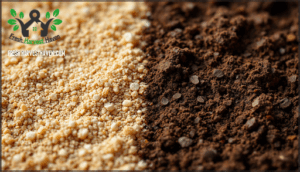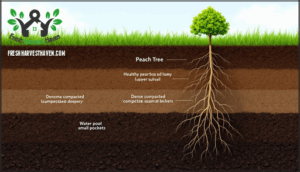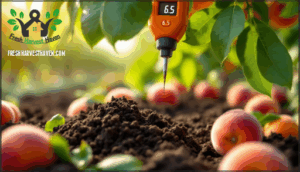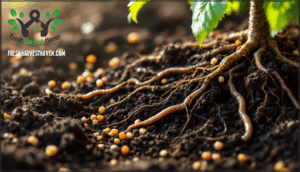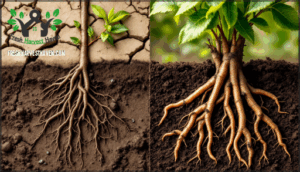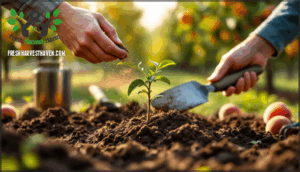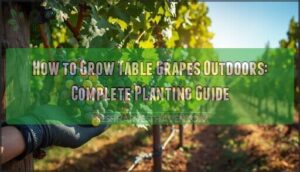This site is supported by our readers. We may earn a commission, at no cost to you, if you purchase through links.
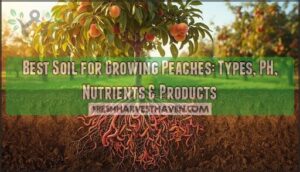
Your choice of soil determines not just survival but peak performance, influencing everything from nitrogen uptake efficiency to disease resistance. Understanding the interplay between texture, pH, and nutrient availability lets you engineer conditions where peach trees don’t just grow—they flourish with vigorous roots, abundant blooms, and fruit that reflects the soil’s quality.
Table Of Contents
- Key Takeaways
- Best Soil Types for Growing Peaches
- Optimal Soil PH for Peach Trees
- Essential Soil Nutrients for Peaches
- Improving Soil Drainage and Structure
- Amending Soil for Healthier Peach Trees
- Top Soil Products for Peach Trees
- Dr Earth Fruit Tree Fertilizer
- Miracle-Gro Citrus Avocado Mango Food
- Natural Guard Organic Garden Soil Mix
- Dr Earth Fruit Tree Planting Mix
- Citrus Tree Potting Soil Mix
- Gardenera Peach Potting Soil Mix
- Gardenera Peach Tree Potting Soil
- Espoma Tree Tone Plant Food
- Fruit Tree Booster Fertilizer Concentrate
- Down to Earth Fruit Tree Fertilizer
- Frequently Asked Questions (FAQs)
- What is the best soil for a peach tree?
- Why do peach trees need a good soil type?
- Is Sun Gro soil good for peach trees?
- Can peach trees grow in sandy soil?
- Should you prepare soil before planting a peach tree?
- What is a good pH level for a peach tree?
- Can peach trees grow in containers successfully?
- How often should I test my soil?
- What causes peach tree leaves to yellow?
- Can I plant peaches near other fruit trees?
- Conclusion
Key Takeaways
- Sandy loam soil delivers 15–25% higher peach yields than loam under identical irrigation because it drains faster, warms earlier in spring, and promotes superior root oxygenation—though it requires more frequent nutrient amendments due to faster nitrogen leaching.
- Maintaining soil pH between 6.0 and 7.0 is critical for peach production, as this range maximizes nutrient availability and can boost yields by 24% compared to acidic conditions, while pH levels outside this zone lock out essential nutrients like iron and zinc.
- Soil depth of at least 3–4 feet is non-negotiable for peach trees, as shallow profiles restrict root penetration, reduce drought resilience by 20–25%, and cut nutrient uptake efficiency by the same margin compared to deeper soils.
- Peach trees need balanced macronutrients (nitrogen at 2.60–3.50% leaf tissue, phosphorus at 0.14–0.40%, potassium at 2.00–3.00%) alongside critical micronutrients like iron, zinc, and boron—deficiencies show up first in leaf symptoms like chlorosis and tip burn before fruit quality declines.
Best Soil Types for Growing Peaches
The foundation of a thriving peach orchard starts beneath the surface, where soil texture, structure, and depth determine whether your trees will flourish or struggle.
Not all soils support peach trees equally—some drain too quickly, others retain water too long, and many lack the physical properties needed for vigorous root development.
Let’s examine the specific soil types that give peach trees their best chance at producing abundant, flavorful fruit.
Loamy Vs. Sandy Loam Soils
Between these two soil types, your choice shapes water retention, nutrient leaching, and root oxygenation—all critical for fruit yield. Here’s what sets them apart:
- Sandy loam drains faster (1.0–2.0 inches/hour) and warms earlier in spring, advancing flowering by up to 10 days
- Loamy soil holds 10–20% more organic matter and retains nutrients better, reducing nitrogen leaching considerably
- Sandy loam promotes 25–30% higher soil aeration, improving root oxygenation and reducing disease risk
- Loam’s moisture uniformity promotes consistent nutrient delivery but can increase root rot incidence by 20% in high-rainfall areas
- Field trials show sandy loam yields 15–25% more fruit under identical irrigation, with better pH level stability
For soil preparation, sandy loam requires more frequent soil amendments but offers prime soil drainage—essential for peach success. Best growth also depends on adequate direct sunlight. Soil temperature management also favors sandy loam systems.
Comparing Soil Textures for Peach Trees
Clay soil presents the biggest challenge for peach growers: while it holds moisture and nutrients effectively, it drains at less than 0.5 cm/hour—creating waterlogged conditions that suffocate roots. Your trees need oxygen, and clay’s tight structure limits root penetration depth to just 45 cm versus 90 cm in loam.
Sandy soil swings the opposite direction, draining too fast and leaching nitrogen 15–25% faster than loam.
That’s why loam strikes the ideal balance—moderate water retention rates, 10–25% air-filled porosity, and nutrient availability that boosts yields 15–20% compared to clay soil while maintaining stable pH levels. Selecting the right soil is part of growing healthy peaches.
Soil Depth and Structure Importance
Beyond texture, you need soil that’s at least 3–4 feet deep—anything shallower restricts root penetration and cuts your tree’s drought resilience by 20–25%. Here’s why depth matters:
- Root system development: Deeper soils allow roots to access moisture and nutrients in lower horizons, improving nitrate uptake efficiency.
- Waterlogging effects: Shallow profiles trap water near roots, increasing asphyxiation risk during heavy rainfall.
- Soil compaction: Bulk density above 1.6 g/cm³ blocks root elongation—loamy soils with 40–50% porosity maintain healthy oxygen exchange.
- Nutrient uptake: Trees in 4+ foot soils absorb 20–25% more nitrogen and phosphorus than those in 2-foot profiles.
Soil management techniques like subsoiling break up hardpans, while organic soil amendments reduce compaction by 25–30%, supporting vigorous root growth and better soil drainage improvement for long-term peach production.
Optimal Soil PH for Peach Trees
Your peach trees won’t thrive if the soil pH sits outside their comfort zone. Getting the acidity level right unlocks nutrients, strengthens roots, and sets the stage for abundant harvests.
Here’s what you need to know about managing pH for healthy peach production.
Ideal PH Range (6.0–7.0)
You want your peach trees to thrive in soil with a pH between 6.0 and 7.0—this range is where nutrient uptake, microbial activity, and disease resistance align perfectly. Field studies show that maintaining soil pH around 6.5 boosted average fruit yield by 24% compared to acidic conditions at pH 5.5.
Peach trees thrive in soil with pH 6.0–7.0, where nutrient uptake peaks and yields increase up to 24% compared to acidic conditions
Proper soil management techniques and well-drained soil conditions support soil fertility, while regional practices emphasize pre-plant testing to confirm your soil pH falls within this ideal range for consistent production.
Adjusting Soil PH for Peaches
When your soil pH drifts outside the 6.0–7.0 ideal range, you’ll need to take action through deliberate soil preparation for peach trees. Lime application at 1 to 4 tons per acre raises pH in acidic soil, while sulfur application temporarily lowers alkaline soil conditions.
Fertilizer effects matter too—ammonium-based options acidify soil, whereas nitrate forms push pH upward. Organic amendments like pine bark mulch offer gradual pH shifts.
Monitoring strategies through periodic soil testing keep amended soil aligned with your peach trees’ needs.
Effects of PH on Nutrient Availability
At pH 6.0–7.0, nutrient solubility peaks, maximizing macronutrient uptake of nitrogen, phosphorus, and potassium while guaranteeing micronutrient bioavailability for your peach trees. Outside this range, soil conditions trigger nutrient deficiency—acidic soils below 5.5 impair root function and microbial activity, while alkaline soils above 7.5 lock out iron and zinc, slashing peach productivity by 20–40%.
Proper nutrient management through pH control directly fosters vigorous growth and abundant harvests.
Essential Soil Nutrients for Peaches
Peach trees won’t thrive on sunlight and water alone—they need a steady supply of specific nutrients to fuel growth, fruit production, and overall resilience. Understanding which nutrients matter most and how they work together helps you create a feeding plan that maintains healthy trees and abundant harvests.
Let’s look at the essential nutrients your peach trees depend on and how to recognize when something’s missing.
Key Macronutrients: Nitrogen, Phosphorus, Potassium
Your peach trees depend on three macronutrients to thrive: nitrogen for leaf growth, phosphorus for root and bloom development, and potassium for fruit quality.
You’ll need 50–100 lbs of nitrogen per acre annually, with leaf tissue levels between 2.60% and 3.50% indicating proper uptake. Phosphorus availability promotes strong roots when maintained at 0.14%–0.40% of dry weight, while potassium quality improves sweetness and color at 2.00%–3.00%.
Balanced NPK ratios prevent nutrient deficiency and maintain healthy nutrient management throughout the growing season.
Important Micronutrients and Their Roles
While macronutrients drive overall growth, micronutrients fine-tune your tree’s internal machinery. You’ll want to monitor five critical trace elements through regular leaf analysis and soil testing:
- Iron (80–150 ppm): Prevents interveinal chlorosis in young leaves; foliar chelated sprays correct iron deficiency on high-pH soils within weeks
- Zinc (around 50 ppm): Aids enzyme activation and shoot elongation; zinc uptake drops sharply in alkaline conditions
- Boron (28–43 ppm): Essential for fruit set and pollen tube formation; boron toxicity occurs above 80 ppm
- Manganese (120–150 ppm): Powers photosynthesis; manganese levels decline when fertilizing without testing first
- Copper (near 12 ppm): Strengthens disease resistance; copper needs increase in sandy, organic matter-rich soils
Recognizing Nutrient Deficiencies
Your tree’s leaves tell the story of its nutrient status long before fruit quality declines. Early detection through visual indicators and timely leaf analysis lets you apply corrective actions before yield drops.
| Deficiency | Visual Symptoms | Leaf Threshold |
|---|---|---|
| Nitrogen | Light-green leaves with red spotting; premature drop | <2.2% dry weight |
| Potassium | Tip burn and marginal chlorosis progressing to necrosis | <1.2% dry weight |
| Zinc | Narrow, pointed leaves (little leaf); interveinal chlorosis | <15 ppm |
Nutrient mobility matters when diagnosing deficiency symptoms. Mobile nutrients like nitrogen show problems in older leaves first, while immobile iron and zinc affect young growth. Schedule leaf analysis mid-summer and adjust your fertilizer application based on lab results rather than guessing—fertilizing peach trees without testing often worsens imbalances.
Improving Soil Drainage and Structure
Poor drainage can kill peach trees faster than almost any other problem, so it’s worth getting this right from the start. You’ll need to recognize the warning signs early and know which techniques actually work for your specific soil type.
Whether you’re dealing with heavy clay or just a low spot that holds water, the following approaches will help you create the conditions peach roots need to thrive.
Signs of Poor Drainage
Have you noticed standing water in your orchard that just won’t drain? Waterlogged symptoms appear when soil infiltration fails, and recognizing them early protects root health and prevents root rot.
Watch for these clear indicators:
- Surface water persisting more than 24 hours after rainfall
- Gray or bluish subsoil instead of healthy red or brown coloration
- Sour or metallic odor from anaerobic soil changes
Foliage responses include yellowing leaves and stunted growth. Clay soil is especially prone to these issues compared to well-drained soil, which encourages vigorous root growth. Drainage tests confirm whether your site needs intervention.
Techniques for Better Drainage
You can solve drainage challenges with proven soil amendment techniques that target the root cause. Subsoiling methods break compacted layers 45–60 cm deep, increasing root penetration up to 65%. Incorporating organic amendments like compost improves infiltration rates in clay soil by 50% within one season.
Berm planting raises trees 25–40 cm above grade, preventing waterlogging. Subsurface drains, installed 60–100 cm deep, remove 40% of excess groundwater.
Surface grading at 2–5% slopes directs runoff away from roots, transforming poor soil conditions into well-drained soil that fosters healthy growth.
Raised Beds and Site Elevation
Raising your peach planting site tackles drainage and frost concerns simultaneously. Constructed raised beds 12–18 inches high doubled yields over seven years through improved soil aeration and root rot reduction. Site elevation matters equally—positioning trees five feet above surrounding terrain minimizes frost injury through natural cold air drainage.
Consider these benefits when planning soil preparation and planting:
- High beds improve water efficiency in well-drained soil while reducing waterlogging stress
- Elevated mounds lower soil temperature slightly, improving drainage in clay soil conditions
- Strategic site selection prevents stagnant cold air accumulation that damages blossoms
Supplemental irrigation becomes necessary during summer months, as raised configurations drain faster than flat ground installations.
Amending Soil for Healthier Peach Trees
Even the best soil can fall short of what your peach trees truly need to thrive. You can correct deficiencies and improve soil structure through targeted amendments that address specific problems in clay, sandy, or loamy conditions.
The following strategies will help you create an environment where your peach trees establish strong roots and produce abundant fruit.
Adding Compost and Organic Matter
Enriching amended soil with compost delivers measurable long-term benefits for peach cultivation. Annual compost application rates of 10 to 20 tons per acre can replace up to 80–100% of synthetic fertilizer needs while boosting soil organic matter by 0.5–1.2%.
This improved soil nutrient content enhances tree physiological performance, including 20% greater trunk diameter growth and 15% higher chlorophyll content. Fruit yield quality also improves, with compost-treated orchards producing 15% higher marketable yields and fruit 8–14% heavier than controls.
| Compost Benefit | Measured Impact |
|---|---|
| Soil organic matter increase | 0.5–1.2% after 4 years |
| Trunk diameter growth | 20% greater than controls |
| Chlorophyll content improvement | 15% increase |
| Marketable yield boost | 15% higher per hectare |
Amending Clay, Sandy, and Loamy Soils
Tailoring amended soil to your specific texture makes all the difference. Clay soil struggles with drainage—you’ll need 2 to 4 inches of compost annually to boost porosity by 40% and raise berms 12–18 inches high. Sandy soil drains too fast, so add organic matter at 20–25% volume to improve water retention by 60%. Loamy soil already balances aeration and drainage beautifully, but annual compost keeps organic matter above 3% for peak yields.
- Clay particles under 0.002 mm trap water and suffocate roots
- Gypsum loosens clay, deepening root penetration by 15%
- Biochar in sandy soil lifts nutrient-holding capacity dramatically
- Loam’s 40% sand, 40% silt, 20% clay mix drains perfectly
- Fall or spring amendments work best when soil hits 10–20°C
Balance your nutrient levels—nitrogen at 30–50 ppm, phosphorus at 15–25 ppm, potassium at 150–200 ppm—and test soil yearly to track pH shifts. Cover crops between rows can fix 60–110 pounds of nitrogen per acre annually, turning seasonal practices into long-term soil management techniques that maintain healthier, more productive peach trees.
Using Mulch for Moisture Retention
When you apply a 2–3 inch layer of organic mulch around your peach tree, you’re doing more than tidying up—you’re cutting water evaporation by up to 50% while stabilizing soil temperature swings by 2–5°C. This improved moisture capacity translates directly into stronger peach tree growth, with studies showing 20% yield increases from better water use efficiency.
Keep mulch 10–15 cm from the trunk to prevent disease and replenish annually for sustained benefits.
Top Soil Products for Peach Trees
You’ve prepared your soil, adjusted the pH, and improved drainage—now it’s time to choose the right products to support your peach trees.
The following options include fertilizers, planting mixes, and specialized soils designed to meet the nutritional and structural needs of peach cultivation. Each product offers distinct benefits depending on your soil conditions and tree stage.
Dr Earth Fruit Tree Fertilizer
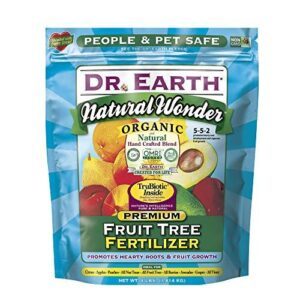
Dr. Earth Natural Wonder Fruit Tree Fertilizer delivers a balanced 5-5-2 NPK nutrient profile designed specifically for peach trees and other fruit-bearing species. This organic fertilizer combines natural ingredients like feather meal, bone meal, and kelp with TruBiotic beneficial soil microbes that boost nutrient uptake and root development.
- Organic certification: OMRI-listed formula meets strict organic production standards
- Microbial additives: Contains five Bacillus strains plus mycorrhizal fungi for improved soil health
- Application guidelines: Apply every two months during growing season, one foot from trunk to drip line
The sustainable production process guarantees food-grade ingredients safe for pollinators, while the continuous-release formulation feeds your peach trees for up to three months.
Miracle-Gro Citrus Avocado Mango Food
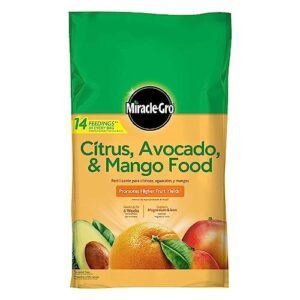
Miracle-Gro Citrus Avocado Mango Food features an NPK ratio of 8-2-10 with added magnesium, sulfur, and iron to address micronutrient deficiencies in your peach trees. This granular fertilizer won’t burn roots when applied correctly, and you’ll see visible improvements in foliage and fruit quality within eight weeks.
Apply every three months during the growing season using the shake-and-feed method—just work it into the top three inches of soil around your tree’s drip line while avoiding direct trunk contact.
Natural Guard Organic Garden Soil Mix
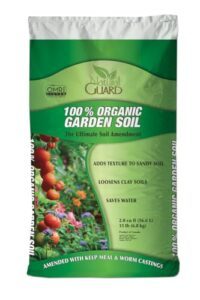
Natural Guard Organic Garden Soil Mix works as a sustainable alternative to synthetic amendments, combining black peat, worm castings, kelp meal, and limestone to support peach tree establishment. This OMRI-listed product delivers moisture retention—retaining up to 12 times its weight in water—while buffering pH between 6.0–7.0 and providing slow-release nutrients through organic composition.
- Black peat maintains soil hydration during hot summer months
- Worm castings supply nitrogen, phosphorus, and potassium for fruit development
- Kelp meal contributes trace elements like zinc and iron
- Dolomitic limestone naturally adjusts acidic soil pH
- Humic acids improve nutrient uptake by 25% compared to standard peat
Mix 30–40% with native amended soil when planting to improve drainage and nutrient support for organic gardening methods.
Dr Earth Fruit Tree Planting Mix
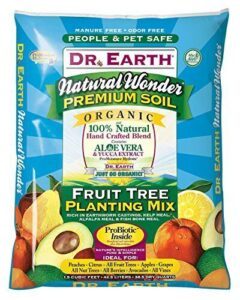
Dr Earth Fruit Tree Planting Mix delivers complete soil enrichment through its organic composition of forest humus, worm castings, kelp meal, and beneficial mycorrhizae. This adaptable formula improves nutrient delivery in both amended soil and containers while stabilizing pH between 6.0–7.0 with dolomite lime.
ProMoisture technology maintains balanced hydration in well-drained soil conditions, supporting sustainability through renewable resources.
Mix 50% with native soil during planting to improve soil structure and root establishment.
Citrus Tree Potting Soil Mix
Citrus Tree Potting Soil Mix adapts well to container-grown peaches through its balanced formulation of 40–50% organic matter, 25–30% perlite, and 20–30% sand. This composition maintains pH between 5.8–6.5 while supporting drainage needs and aeration factors essential for healthy root development.
Commercial blends like Perfect Plants include slow-release 18-6-8 fertilizer, sustaining nutrient management for up to twelve months in amended soil conditions.
Gardenera Peach Potting Soil Mix
Gardenera Peach Potting Soil Mix combines peat moss, worm castings, charcoal, sand, cow manure, and compost to create well-drained soil conditions ideal for container peaches. This ingredient composition takes into account three critical growing factors:
- Nutrient delivery through organic matter and worm castings for sustained plant vigor
- Aeration drainage via sand and charcoal, preventing waterlogging and root suffocation
- Soil health from compost-enriched microbes supporting vigorous nutrient management
The pH-balanced formulation simplifies application use—just fill your container, plant, and water thoroughly to activate its properties.
Gardenera Peach Tree Potting Soil
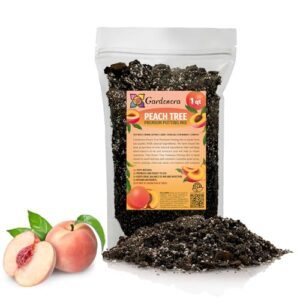
Another option from Gardenera’s lineup—Gardenera Peach Tree Potting Soil—features peat moss, worm castings, activated charcoal, sand, cow manure, and compost. This well-drained soil blend promotes container gardening with nutrient balance and water retention properties suited for potted peach tree cultivation.
You’ll find it optimized for limited soil volumes, delivering microbes and organic nutrients that encourage root development. Fill your container completely and water thoroughly to activate the topsoil ingredients for healthy growth and fruit production.
Espoma Tree Tone Plant Food
Espoma Tree-Tone stands apart as a certified organic fertilizer delivering 15 nutrients through its 6-3-2 NPK ratio and Bio-Tone microbes. This slow-release formula strengthens root systems while improving soil structure and moisture retention.
Apply twice yearly—early spring and late fall—based on trunk diameter measured four feet up. Performance data confirms measurable growth increases across multiple tree species, with beneficial microbes enhancing nutrient uptake under varied soil conditions without risk of fertilization burn.
Fruit Tree Booster Fertilizer Concentrate
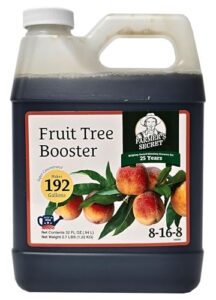
Farmer’s Secret Fruit Tree Booster Concentrate shifts from slow-release to immediate nutrient uptake. Its phosphorus-rich formula delivers rapid results when applied weekly at one teaspoon per gallon along the drip line.
You’ll produce roughly 190 gallons from a single bottle at $0.16 per application, making this cost efficiency standout among liquid fertilizers. Application timing matters most during early spring when your peach trees emerge from dormancy, with field trials showing 35% higher fruit set.
Sandy and loamy soil compatibility promotes quick nutrient mobility, though proper dilution prevents root burn from concentrated synthetic compounds.
Down to Earth Fruit Tree Fertilizer
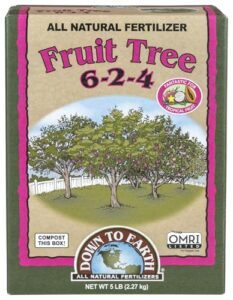
With organic certification and a balanced 6-2-4 NPK ratio, Down to Earth Fruit Tree Fertilizer delivers slow-release nutrients through feather meal and fish bone meal.
You’ll apply 2 cups per trunk diameter inch for young trees or 8 pounds annually for bearing peaches, worked into soil from trunk to drip line.
Humic acids boost nutrient uptake while improving soil structure and microbial activity in loamy conditions.
Frequently Asked Questions (FAQs)
What is the best soil for a peach tree?
The ideal soil for a peach tree is well-drained sandy loam—think of it as creating a comfortable home where roots can breathe freely.
This soil composition balances water retention with proper aeration, guaranteeing root health while preventing waterlogged conditions that spell trouble for your tree.
Why do peach trees need a good soil type?
Good soil conditions directly influence root health and nutrient uptake in peach trees. Well-drained soil promotes strong root development, which drives tree vigor, water retention, and ultimately fruit quality through effective soil management techniques.
Is Sun Gro soil good for peach trees?
Sun Gro soil aids peach trees well when it offers well-drained soil conditions and aids nutrient management. Since Sun Gro benefits include blended textures, you’ll want to verify drainage capacity.
Some Sun Gro drawbacks involve inconsistent formulations, so compare alternative mixes and cost comparison before committing to long-term effects.
Can peach trees grow in sandy soil?
Peach trees can grow in sandy soil, but you’ll need to address water retention issues and nutrient leaching risk through regular amendments.
Sandy soil benefits from added organic matter to improve moisture-holding capacity and support suitable peach varieties under proper nutrient management.
Should you prepare soil before planting a peach tree?
Preparation acts as the foundation stone—without it, your tree’s future becomes uncertain. You should absolutely prepare soil before planting, as initial soil testing reveals pH and nutrient imbalances that impact root health and early tree growth.
Proper preparation of well-drained soil, even amending clay soil with topsoil, guarantees long-term benefits.
What is a good pH level for a peach tree?
Your peach tree thrives when soil pH stays between 0 and 8, supporting prime nutrient uptake and preventing deficiencies.
Testing methods like soil probes help you monitor conditions, while limestone use adjusts overly acidic soil for better nutrient management in well-drained soil.
Can peach trees grow in containers successfully?
Yes, you can grow peach trees in containers successfully with proper variety selection, adequate container size, appropriate potting mix, consistent watering needs, and careful winter care to prevent root circling and root bound conditions in well-drained soil.
How often should I test my soil?
Soil testing isn’t a one-and-done task. Test annually before spring fertilization to track pH and nutrient shifts. If you’re troubleshooting deficiencies or adjusting clay conditions, retest mid-season.
DIY kits work for quick checks; professional analysis offers deeper insights into nutrient management.
What causes peach tree leaves to yellow?
Yellowing leaves often signal chlorosis causes like nutrient deficiencies—especially nitrogen or iron—though watering issues, pest infestation, or disease impact can also compromise tree health.
Your soil conditions and nutrient management practices directly affect leaves and managing fruit tree health.
Can I plant peaches near other fruit trees?
You can plant peaches alongside other fruit trees, but consider pollination concerns, disease spread, root competition, and sunlight access.
Proper site selection for fruit trees and adequate spacing help guarantee shared nutrients don’t limit growth, making companion planting successful when soil conditions support all species.
Conclusion
Like a master chef perfecting their signature dish, selecting the best soil for growing peaches means balancing texture, pH, and nutrients until every element harmonizes. Sandy loam and loam provide the drainage, aeration, and fertility your trees need to flourish.
Amend heavy clay or pure sand, maintain pH between 6.0 and 7.0, and replenish nutrients through compost or targeted fertilizers.
When you engineer these conditions—whether in-ground or raised beds—you’re not just planting trees; you’re building a foundation for abundant harvests that reward your attention to what lies beneath.

